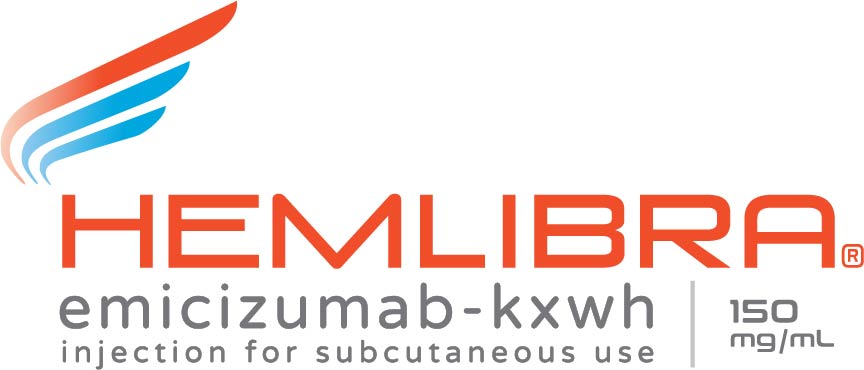
Side Effect Reporting
You may report side effects to the FDA at (800) FDA-1088 or www.fda.gov/medwatch.
You may also report side effects to Genentech at (888) 835-2555.
Support & Resources
Indications & Important Safety Information
Indication
HEMLIBRA is indicated for routine prophylaxis to prevent or reduce the frequency of bleeding episodes in adult and pediatric patients ages newborn and older with hemophilia A with or without factor VIII inhibitors.
Important Safety Information
Boxed WARNING: THROMBOTIC MICROANGIOPATHY and THROMBOEMBOLISM
Cases of thrombotic microangiopathy and thrombotic events were reported when on average a cumulative amount of >100 U/kg/24 hours of activated prothrombin complex concentrate (aPCC) was administered for 24 hours or more to patients receiving HEMLIBRA prophylaxis. Monitor for the development of thrombotic microangiopathy and thrombotic events if aPCC is administered. Discontinue aPCC and suspend dosing of HEMLIBRA if symptoms occur.
Warnings and Precautions
Thrombotic Microangiopathy (TMA) and Thromboembolism Associated With HEMLIBRA and aPCC
In clinical trials, TMA was reported in 0.8% of patients (3/391) and thrombotic events were reported in 0.5% of patients (2/391). In patients who received at least one dose of aPCC, TMA was reported in 8.1% of patients (3/37) and thrombotic events were reported in 5.4% of patients (2/37). Patients with TMA presented with thrombocytopenia, microangiopathic hemolytic anemia, and acute kidney injury, without severe deficiencies in ADAMTS13.
Consider the benefits and risks if aPCC must be used in a patient receiving HEMLIBRA prophylaxis. Due to the long half-life of HEMLIBRA, the potential for an interaction with aPCC may persist for up to 6 months after the last dose. Monitor for the development of TMA and/or thromboembolism when administering aPCC. Immediately discontinue aPCC and interrupt HEMLIBRA prophylaxis if clinical symptoms, imaging, or laboratory findings consistent with TMA and/or thromboembolism occur, and manage as clinically indicated. Consider the benefits and risks of resuming HEMLIBRA prophylaxis following complete resolution of TMA and/or thrombotic events on a case-by-case basis.
Immunogenicity
Treatment with HEMLIBRA may induce anti-drug antibodies. Anti-emicizumab-kxwh antibodies were reported in 5.1% of patients (34/668) treated with HEMLIBRA in clinical trials. Most patients with anti-emicizumab-kxwh antibodies did not experience a change in HEMLIBRA plasma concentrations or an increase in bleeding events; however, in uncommon cases (incidence <1%), the presence of neutralizing antibodies with decreasing plasma concentration may be associated with loss of efficacy.
Monitor for clinical signs of loss of efficacy (eg, increase in breakthrough bleeding events) and if observed, promptly assess the etiology and consider a change in treatment if neutralizing anti-emicizumab-kxwh antibodies are suspected.
Laboratory Coagulation Test Interference
HEMLIBRA affects intrinsic pathway clotting-based laboratory tests, including activated clotting time (ACT); activated partial thromboplastin time (aPTT); and all assays based on aPTT, such as one-stage, factor VIII (FVIII) activity. Therefore, intrinsic pathway clotting-based coagulation laboratory test results in patients who have been treated with HEMLIBRA prophylaxis should not be used to monitor HEMLIBRA activity, determine dosing for factor replacement or anti-coagulation, or measure FVIII inhibitor titers.
Results affected by HEMLIBRA: aPTT; Bethesda assays (clotting-based) for FVIII inhibitor titers; one-stage, aPTT-based single-factor assays; aPTT-based Activated Protein C Resistance (APC-R); ACT.
Results unaffected by HEMLIBRA: Bethesda assays (bovine chromogenic) for FVIII inhibitor titers; thrombin time (TT); one-stage, prothrombin time (PT)-based single-factor assays; chromogenic-based single-factor assays other than FVIII (see Drug Interactions for FVIII chromogenic activity assay considerations); immuno-based assays (ie, ELISA, turbidimetric methods); genetic tests of coagulation factors (eg, Factor V Leiden, Prothrombin 20210).
Most Common Adverse Reactions
The most common adverse reactions (incidence ≥10%) are injection site reactions, headache, and arthralgia.
Adverse Reactions
Characterization of aPCC Treatment in Pooled Clinical Trials
There were 130 instances of aPCC treatment in 37 patients, of which 13 instances (10%) consisted of on average a cumulative amount of >100 U/kg/24 hours of aPCC for 24 hours or more; 2 of the 13 were associated with thrombotic events and 3 of the 13 were associated with TMA. No TMA or thrombotic events were associated with the remaining instances of aPCC treatment.
Injection Site Reactions
In total, 85 patients (22%) reported injection site reactions (ISRs). All ISRs observed in HEMLIBRA clinical trials were reported as mild to moderate intensity and 93% resolved without treatment. The commonly reported ISR symptoms were injection site erythema (11%), injection site pruritus (4%), and injection site pain (4%).
Other Less Common (<1%) Reactions
Rhabdomyolysis was reported in 2 adult patients with asymptomatic elevations in serum creatine kinase without associated renal or musculoskeletal symptoms. In both instances, the event occurred following an increase in physical activity.
Drug Interactions
Clinical experience suggests that a drug interaction exists with HEMLIBRA and aPCC.
Pregnancy, Lactation, Females and Males of Reproductive Potential
Women of childbearing potential should use contraception while receiving HEMLIBRA. It is not known whether HEMLIBRA can cause fetal harm when administered to a pregnant woman or can affect reproduction capacity. HEMLIBRA should be used during pregnancy only if the potential benefit for the mother outweighs the risk to the fetus. The developmental and health benefits of breastfeeding should be considered along with the mother’s clinical need for HEMLIBRA and any potential adverse effects on the breastfed child from HEMLIBRA or from the underlying maternal condition.
You may report side effects to the FDA at (800) FDA-1088 or www.fda.gov/medwatch. You may also report side effects to Genentech at (888) 835-2555.
Please see the HEMLIBRA full Prescribing Information for additional Important Safety Information, including Boxed WARNING.